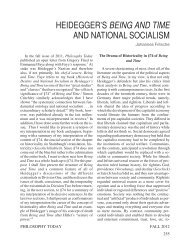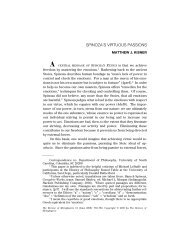The Essay as Self-Knowledge: Montaigne's Philosophical ...
The Essay as Self-Knowledge: Montaigne's Philosophical ...
The Essay as Self-Knowledge: Montaigne's Philosophical ...
Create successful ePaper yourself
Turn your PDF publications into a flip-book with our unique Google optimized e-Paper software.
76 ANN HARTLE<br />
accidental they seem.” <strong>The</strong> poetic order is daemonic. <strong>The</strong> poetic author<br />
(including philosophers like Plato and Plutarch) often seems to<br />
forget his own topic. But it is precisely here that Montaigne says that<br />
“it is the inattentive reader who loses my subject, not I.” Beneath<br />
this appearance of digression upon digression there is an underlying<br />
subject. <strong>The</strong>se poetic authors seem to be tossed in the wind, their<br />
sallies seem nonchalant and accidental: “My style and my mind alike<br />
go roaming. ‘A man must be a little mad if he does not want to be<br />
even more stupid’ say the precepts of our m<strong>as</strong>ters, and even more so<br />
their examples” (VS994; F761). <strong>The</strong>re is an underlying oracular and<br />
daemonic quality that appears in the poetic sallies of Plato and<br />
Plutarch, and in the roaming of the <strong>Essay</strong>s. 22<br />
What sense, then, can we make of the order of the essays?<br />
Montaigne’s order is b<strong>as</strong>ed on the nature of the human mind and on<br />
the order of thought itself. 23 In the “Apology for Sebond,” Montaigne<br />
goes through a long discussion of the animals, showing how we are<br />
not so superior to them <strong>as</strong> we might think. <strong>The</strong>re are, of course, numerous<br />
stories about dogs and, after recounting one such dog story<br />
from Plutarch, Montaigne turns from dogs to stories of oxen, elephants,<br />
and birds. <strong>The</strong>n he writes: “I do not want to omit citing also this<br />
other example of a dog that the same Plutarch says he saw (for <strong>as</strong> for<br />
the order, I fully realize that I am disturbing it; but I observe none in<br />
arranging these examples any more than in the rest of my work)”<br />
(VS465; F341). He then goes on to tell another story of a dog that<br />
Plutarch claims to have observed. On one level and according to one<br />
meaning of ‘order,’ he h<strong>as</strong> disturbed the order by suddenly going<br />
back to dogs after having finished with them to turn to oxen, elephants,<br />
and birds: this is the order of “things” that he h<strong>as</strong> interrupted. But<br />
the other level of order that he h<strong>as</strong> not really interrupted is the order<br />
of testimony and of witnesses, for the story of the magpie that precedes<br />
the intrusive dog story is also from Plutarch. Montaigne’s mind<br />
is following not the order of things and kinds, but rather the order of<br />
human testimony and of conversation. This is the order of the human<br />
mind, not the order of the divine intellect of the ancient philosophers.<br />
What order there is in the <strong>Essay</strong>s seems to be an attempt to bring<br />
under the mind’s control the wild flow of chimer<strong>as</strong> and monsters<br />
that the mind gives rise to all on its own. “In order to train my fancy<br />
even to dream with some order and purpose, and in order to keep it<br />
from losing its way and roving with the wind, there is nothing like

















